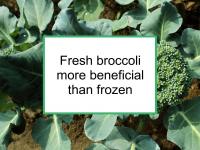Cruciferous vegetables contain a variety of sulfur-containing compounds called glucosinolates which can be converted into various isothiocyanates that are believed to prevent cancer and its recurrence. Sulforaphane is an isothiocyanate derived primarily from the consumption of broccoli sprouts, broccoli, brussels sprouts, cabbage and bok choy.
Sulforaphane has been shown to reduce the growth of breast cancer stem cells and impair their viability. Sulforaphane has also been found to suppress primary tumor growth in a mouse model of breast cancer, as well as reducing axillary lymph node metastasis in mice.
Latest research finds fresh is superior to commercial frozen broccoli
The study referenced at the beginning of this news article was designed to compare the bioavailability of sulforaphane from lightly cooked fresh and frozen broccoli. The study included 18 healthy participants who consumed broccoli soup made either from lightly cooked fresh or frozen broccoli florets. Blood and urine samples were obtained to assess sulforaphane in plasma and urine. The bioavailability of sulforaphane from fresh broccoli soup consumption was found to be approximately 10 times that of frozen broccoli soup. The difference was shown to be a result of destruction of myrosinase activity caused by the commercial blanching and freezing process. The authors conclude that the short period of blanching used to make frozen broccoli destroys myrosinase and substantially reduces the bioavailability of sulforaphane.
